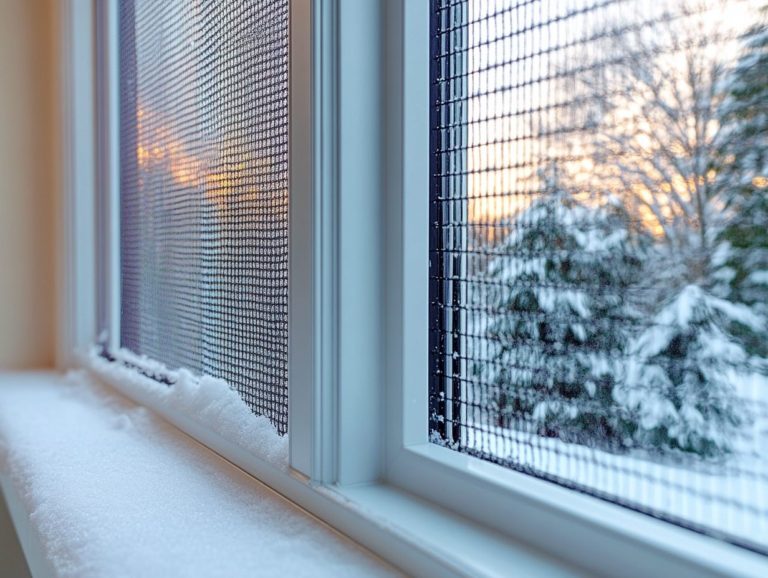5 Quick Tips for Managing Winter Pests
As winter approaches, you may unknowingly invite a range of unwelcome guests into your home pests seeking warmth and shelter. From sneaky rodents to bothersome insects, these winter intruders can disrupt your peace and compromise your health. But fear not; warding them off is more manageable than you might assume.
Here, you ll find five practical tips to fortify your home against pests, along with insights on how to identify infestations, recognize potential dangers, and implement effective removal methods. Embrace the season in comfort, knowing your home can be both cozy and pest-free this winter!
Contents
- Key Takeaways:
- 1. Seal Any Cracks or Openings in Your Home
- 2. Keep Your Home Clean and Clutter-Free
- 3. Store Firewood Away from Your House
- 4. Trim Back Trees and Shrubs Near Your Home
- 5. Use Natural Pest Repellents
- What Are the Most Common Winter Pests and How Do They Enter Your Home?
- How Can You Identify Signs of a Pest Infestation in Your Home?
- What Are the Dangers of Winter Pests and How Can They Affect Your Home?
- How Can You Prevent Winter Pests from Entering Your Home?
- What Are the Best Methods for Removing Winter Pests from Your Home?
- How Can You Maintain a Pest-Free Home During the Winter Months?
- Frequently Asked Questions
- What are common winter pests and how can I prevent them?
- Why are pests attracted to my home during winter?
- How can I keep rodents out of my home during winter?
- What are some natural ways to repel pests during winter?
- How do I know if I have a pest infestation in my home during winter?
- Is it important to continue pest control measures during winter?
Key Takeaways:

Seal any cracks or openings in your home to prevent pests from entering.
Keep your home clean and clutter-free to eliminate potential hiding spots for pests.
Store firewood away from your house to avoid attracting pests into your home.
1. Seal Any Cracks or Openings in Your Home
Sealing cracks or openings in your home is essential for winter pest control. This simple step prevents unwelcome visitors like mice, raccoons, and spiders from invading your space during the colder months when they re actively seeking warmth and shelter.
Inspect key areas such as windows, doors, chimneys, and plumbing systems. Pay close attention to gaps around frames and seals; these can be easily fixed with weatherstripping, which is material used to seal gaps around doors and windows, or durable caulk, a sealant designed to withstand extreme conditions.
Ensure chimney caps are securely in place, and check that your plumbing is leak-free. Keeping moisture down is crucial, as it can be a beacon for pests. Use pest-proofing materials to seal entry points, enhancing your home s defenses against those pesky winter invaders.
2. Keep Your Home Clean and Clutter-Free
A clean and clutter-free home is one of the most effective pest prevention strategies. By minimizing hiding spots and food sources, you significantly reduce the chances of winter pests like mice, ants, and cockroaches appearing during the holidays. For more detailed tips, check out preventing indoor pests during winter.
Effective sanitation practices complement this proactive approach. For example, store food in sealed, airtight containers to diminish the allure for these unwanted guests.
Keep your gutters clean and free of debris; clogged gutters can become a breeding ground for outdoor pests, granting them easy access to your living space. A tidy environment not only discourages pests but also enhances overall home hygiene.
By prioritizing these practices, you create a sanctuary that is both welcoming to you and uninviting to unwanted guests.
3. Store Firewood Away from Your House
Proper firewood storage is crucial for maintaining a pest-free winter. Keep your firewood at least 20 feet away from your home to significantly reduce the chances of unwelcome guests like termites and spiders making their way inside.
Stack the wood off the ground on a pallet or use a firewood rack to enhance air circulation, allowing moisture to evaporate an essential step in preventing mold growth and decay. Make sure the wood is fully seasoned before stacking; damp wood is a magnet for pests.
Regularly inspect your stored wood for signs of pest activity, such as bore holes or webbing. Employing natural pest management strategies, like placing insect repellents or traps nearby, can provide an extra layer of protection for your firewood supply.
Act now to protect your home this winter! Follow these tips today to enjoy a pest-free winter.
4. Trim Back Trees and Shrubs Near Your Home

Trimming trees and shrubs near your home creates a natural barrier against pests like squirrels, raccoons, and bats. These animals may seek refuge during winter months.
Certain plants, like fruit trees and flowering shrubs, can attract unwelcome guests. Carefully selecting and managing your landscaping is essential.
Regular inspections of these areas not only boost your home s look but also help you spot potential problems early. By pest-proofing these sections, you enhance your home s defenses.
5. Use Natural Pest Repellents
Natural pest repellents protect your home from winter pests while supporting eco-friendly practices. This approach avoids harmful chemicals.
Repellents like essential oils and diatomaceous earth a powder that damages pests’ exoskeletons are great alternatives. For instance, peppermint oil deters mice, while vinegar repels ants.
Applying these solutions is easy; just a few drops or diluted mixtures can help. You ll want to see how well they work and adjust your strategy as needed.
What Are the Most Common Winter Pests and How Do They Enter Your Home?
Common winter pests, like mice, cockroaches, and bats, look for shelter from the cold. Knowing this helps you quickly find how these pests enter your home.
They use small cracks in walls and gaps around windows as entry points. Mice can squeeze through spaces as tiny as a dime!
Many pests enter a dormant state outside but quickly adapt once indoors. This increases their visibility and activity, so take proactive steps to secure your home.
How Can You Identify Signs of a Pest Infestation in Your Home?
Spotting signs of a pest infestation requires a keen eye. Early detection can save you money and hassle.
Listen for subtle scratching in the walls or look for small holes near baseboards. Unpleasant odors can also indicate larger infestations.
Regularly inspect entry points and keep outdoor spaces tidy. Sealing cracks and storing food in airtight containers minimizes risks.
What Are the Dangers of Winter Pests and How Can They Affect Your Home?

Winter pests can pose serious threats to your home. They can lead to structural damage, spread diseases, and create unsanitary conditions. This makes effective pest management essential for protecting your living environment during the colder months.
Take mice, for instance. They breed rapidly and can chew through electrical wiring and insulation, resulting in costly repairs. They also carry diseases like hantavirus and salmonella, which you definitely want to avoid.
Then there are cockroaches, which thrive in warm spots, often making kitchens and bathrooms their home. They can contaminate your food and surfaces, increasing the risk of asthma and other allergic reactions.
Moisture control is crucial to preventing these infestations. Check your plumbing regularly and seal any leaks to keep pests at bay and avoid mold growth.
How Can You Prevent Winter Pests from Entering Your Home?
Preventing winter pests from invading your home requires a proactive approach to pest control. Incorporate a variety of effective prevention strategies, such as following these 5 steps for successful winter pest control. Start by sealing entry points, reducing outdoor attractants, and maintaining a spotless environment.
To effectively deter pests, inspect the exterior of your home for cracks or gaps. Use caulk or weather stripping to seal them. Regularly check your yard for debris and address any standing water, which can make your home appealing to pests.
Rethink your storage practices by keeping food in airtight containers. Ensure your trash bins have tight-fitting lids. These simple adjustments can significantly reduce risks. By implementing a combined pest management approach along with best practices for pest monitoring in winter, you can stay ahead of potential infestations and create a pest-free haven during the colder months.
What Are the Best Methods for Removing Winter Pests from Your Home?
The most effective methods for removing winter pests involve a thoughtful blend of pest management strategies. Focus on 5 techniques for winter pest management, vigilant pest monitoring, and enhancing sanitation practices to eliminate the conditions that attract unwelcome visitors.
To achieve optimal results, consider utilizing traps for immediate relief for those pesky critters like mice or insects that invade during colder months. For a more comprehensive and lasting solution, engaging professional pest control services can be invaluable. These experts possess the skills and tools necessary to tackle severe infestations with precision.
Maintaining rigorous sanitation practices is essential. Seal food and routinely clean potential nesting areas to deter pests from claiming your home. By staying vigilant for signs of pest activity, you can adapt your strategies and swiftly address any resurgence.
How Can You Maintain a Pest-Free Home During the Winter Months?
Maintaining a pest-free home during winter requires your diligent attention to winter pest control efforts. This involves a combination of pest management techniques such as pest-proofing, moisture control, and strict sanitation practices to keep unwanted invaders at bay.
To create a safe and inviting environment, commit to regular home maintenance checks. Pay special attention to exterior inspections that identify vulnerabilities like cracks in the foundation or gaps around windows and doors.
Seasonal adjustments are vital, especially in winter when pests seek cozy indoor refuges. Strengthen your pest-proofing measures by trimming back overgrown branches and sealing off any entry points that pests might exploit, utilizing essential traps for cold-weather pests for added protection.
A holistic approach to pest management isn t just about quick fixes. It also involves proactive strategies that help you stay ahead of potential infestations and maintain a healthier living space all year round.
Frequently Asked Questions

Don’t let pests ruin your winter!
What are common winter pests and how can I prevent them?
Common winter pests include rodents, cockroaches, spiders, and ants. To effectively manage these issues, consider using essential cold-weather pest management tools and seal any cracks and openings in your home to keep them away.
Also, store food properly and remove standing water to deter these pests.
Why are pests attracted to my home during winter?
Pests look for warm places in winter. Your cozy home provides the perfect shelter and food source for them.
How can I keep rodents out of my home during winter?
Keep your home clean and clutter-free to discourage rodents. Store food in airtight containers and seal any entry points.
If needed, set traps to catch any that manage to enter.
What are some natural ways to repel pests during winter?
You can use essential oils like peppermint or lavender to repel pests. Planting pest-repelling plants and using a vinegar-water mix for cleaning can also help.
How do I know if I have a pest infestation in my home during winter?
Look for signs like droppings, chewed wires, or furniture. A musty smell can also indicate an infestation.
If you notice these signs, call a professional pest control service right away.
Is it important to continue pest control measures during winter?
Yes, continuous pest control is crucial in winter to avoid infestations. Pests can still enter and cause damage, so stay vigilant.






